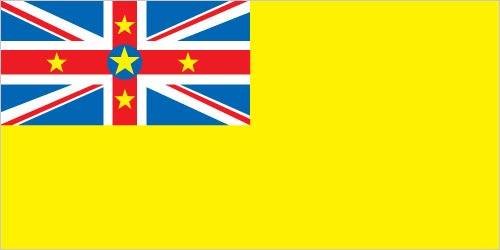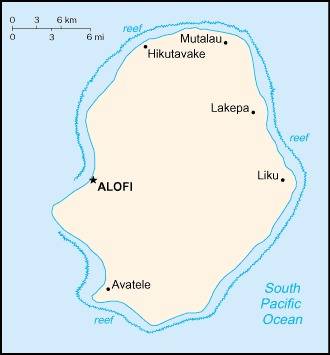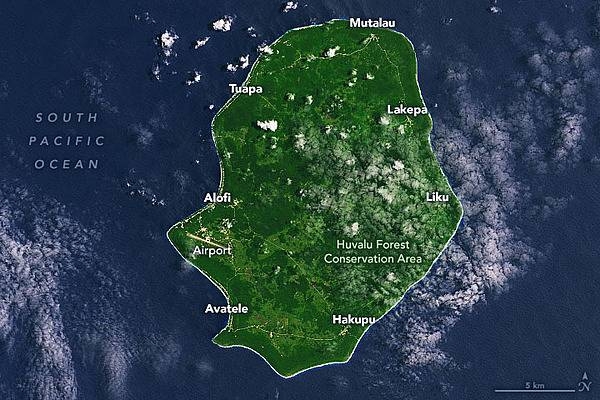45 Niue (partly NZ)

Yellow with the flag of the UK in the upper hoist-side quadrant. The flag of the UK bears five yellow five-pointed stars – a large star on a blue disk in the center and a smaller star on each arm of the bold red cross. The larger star stands for Niue, the smaller stars recall the Southern Cross constellation on the New Zealand flag and symbolize links with that country. Yellow represents the bright sunshine of Niue and the warmth and friendship between Niue and New Zealand.
Flag courtesy of the CIA World Factbook

Map courtesy of the CIA World Factbook

A view of the New Zealand island dependency of Niue with seven of the island’s 14 villages labeled.
Photo courtesy of the CIA World Factbook
Last updated on March 13, 2025
Government
According to Britannica, under the 1974 Niue Constitution Act, Niue is self-governing, though Niueans are New Zealand citizens and members of the Commonwealth. New Zealand is responsible for defense and external affairs as well as administrative and economic assistance as necessary. Executive authority is vested in the British monarch, represented by the governor-general of New Zealand. The leader of the government is the premier, elected by the 20-member Legislative Assembly. The members of the assembly are elected by universal adult suffrage; the legal voting age is 18. The majority of assembly members are elected from village constituencies; the rest are elected by all voters and serve as at-large members. The premier selects a cabinet from among the members of the assembly. A general election is held at least every three years, upon the dissolution of the Legislative Assembly at the request of the premier.
Civil / National Aviation Authority (CAA/NAA)
The Government of New Zealand and Niue – Aviation is an agreement for the provision of advice and technical assistance on matters related to civil aviation safety and security in Niue between the government of Niue and the Civil Aviation Authority of New Zealand established by the New Zealand Civil Aviation Act 1990.
Pacific Aviation Safety Office (PASO)
The Pacific Aviation Safety Office (PASO) is an international organization providing quality aviation safety and security service for Member States in the Pacific.
PASO is the sole international organization responsible for regional regulatory aviation safety oversight service for the 10 Pacific States who are signatories to the Pacific Islands Civil Aviation Safety and Security Treaty (PICASST).
The current PICASST signatories are the Pacific nations of Cook Islands, Kiribati, Nauru, Niue, Papua New Guinea, Samoa, Solomon Islands, Tonga, Tuvalu, and Vanuatu. Associate Members of PASO are Australia, Fiji and New Zealand. Government representatives from these nations make up the PASO Council.
Airspace
SkyVector – Google Maps – ADS-B Exchange
ICAO countries publish an Aeronautical Information Publication (AIP). This document is divided into three parts: General (GEN), En Route (ENR) and Aerodromes (AD). ENR 1.4 details the types of airspace classes they chose to adopt from classes A through G.
Drone Regulations
None found by the author.
However, should you, the reader, happen to stumble across something to the contrary, please email the author at FISHE5CA@erau.edu and you may be mentioned in the ACKNOWLEDGEMENTS section of this book by way of thanks for contributing to this free eBook!
Advanced Air Mobility (AAM) Regulations & Policies
None found by the author.
However, should you, the reader, happen to stumble across something to the contrary, please email the author at FISHE5CA@erau.edu and you may be mentioned in the ACKNOWLEDGEMENTS section of this book by way of thanks for contributing to this free eBook!
Advanced Air Mobility (AAM) News
None found by the author.
However, should you, the reader, happen to stumble across something to the contrary, please email the author at FISHE5CA@erau.edu and you may be mentioned in the ACKNOWLEDGEMENTS section of this book by way of thanks for contributing to this free eBook!
Short Essay Questions
Scenario-Based Question
You have been hired by a Drone Startup Company. Your boss has immediately assigned this job to you.
They need you to prepare a one-page memo detailing the legalities of using a drone in Niue.
They need you to mention any national laws and local ordinances.
They specifically want to know what airspace (insert pictures) you will be operating in and whether or not you need an airspace authorization.
Does it matter whether or not you are a citizen of the country?
Lastly, there is a bonus for you if, as you scroll through this chapter, you find any typos or broken links!
Short Essay Questions
- What are the drone categories?
- How is registration addressed?
- How is remote ID addressed?
- What are the model aircraft rules?
- What are the commercial drone rules?
- Are there waivers or exemptions to the rules? If so, for what?
- Would you share a link to an interactive airspace map?
- How is BVLOS addressed?
- How can you fly drones at night?
- How can you fly drones over people?
- Where do you find drone NOTAMs?
- What are the rules for drone maintenance?
- What are the rules for an SMS program?
- What are some unique rules not mentioned above?
- What are the C-UAS rules?
- What are the AAM rules?

